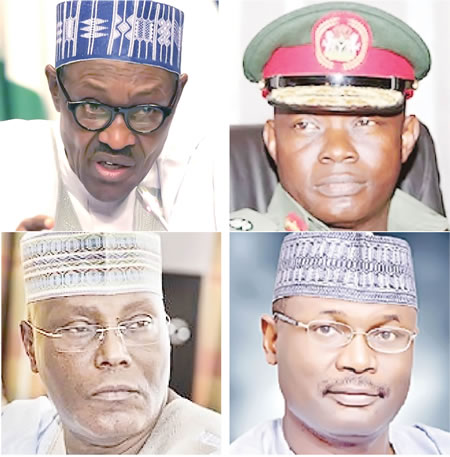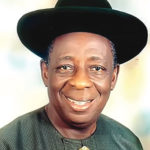The 2019 elections have apparently been won and lost, especially in view of the declaration of the winners by the Professor Mahmud Yakubu-led Independent National Electoral Commission (INEC). But stakeholders have started coming up with detailed descriptions of what could be called the good, the bad and the ugly of the elections.
In Abuja, on Monday, Faith Nwadishi, acting Executive Director of the Centre for Transparency Advocacy (CTA), the body of election observers that went through the length and breadth of the country during the elections held on February 23 and March 9, presided over an occasion where a comprehensive report of the polls was made public.
Present at the event were leaders of the various election observer teams that monitored the elections in the 36 states of the federation and the Federal Capital Territory (FCT) Abuja. It was an occasion to speak truth to power, praise-sing those that deserve commendations and apportion blames where necessary.
Besides the election observers, also present at the event were two national commissioners of INEC, Mrs May Agbamuchay-Mbu and Mallam Muhammed Haruna; the Resident Electoral Commissioner (REC) for Enugu State, Mr Emeka Ononumudu; a representative of the Controller General of the Civil Defence Corps, Mr Obafaiye Sunday; academics and other professionals.
Nwadishi said the observers beamed their searchlights on INEC since it released the notice of poll more than a year before the election. She highlighted a number of steps taken to stabilise the election process, including interactions with the Election Management Board (EMB), the political parties, training of observers and interactions with the civil society, the media and the electorate.
According to the CTA Director, INEC took the task ahead of it seriously by religiously following the timelines and schedule of activities, which included a comprehensive review of the voters’ register and a continuous voter registration cycle. She added that a signal of INEC’s readiness to assert its independence was the denial of candidates of the ruling All Progressives Congress (APC) the chance to participate in elections in Zamfara and Rivers states.
The CTA Director said: “Of course, we did not expect that the political class would accept INEC’s exercise of its independence without a fight, but what shocked Nigerians was the extent they could go to undermine INEC. The brazen manner the security services were used to intimidate INEC officials in their offices and on the field were terrible.
“Yet, INEC officials nationwide refused to be intimidated by threats and violence unleashed on its officials and ad-hoc staff. Indeed, INEC’s brave conduct may have saved our nation from conflagration because it was obvious that elements of the political class, including elements of the ruling class, were bent on mayhem if they didn’t get their way.”
She declared that the election has many heroes as well as a number of villains, adding: “The election has many heroes. The greatest of these heroes are the Nigerian people who initially showed great enthusiasm for the election until their spirits were dampened by the disgraceful conduct of politicians and elements of the security services and the military in the presidential and National Assembly election.
“We salute them for their patience and commitment to stick with the democratic process despite the provocation. The other heroes worth mentioning today are some Resident Electoral Commissioners who unflinchingly committed to the task of delivering a free and fair election in areas under their authority in the face of the challenges thrown at them.
“There is Mr Emeka Ononamadu, the REC for Enugu State who is adjudged by his colleagues to have presided over the most peaceful election in this cycle and who has been so commended by INEC. This is not surprising because the election in Enugu State was quite peaceful and incident-free.
“We also have Mr Mike Igini the REC for Akwa Ibom State and Professor Emeka Ezeonu, the REC for Imo State. Both men showed exemplary courage in ensuring that the elections were conducted in a manner that was free and fair in their states.
“Of course, these men are not the only REcs deserving of praise, but we are using them as examples of the type of service we need in the management of elections in Nigeria. We salute them and their colleagues that acted to protect the people’s mandate by ensuring their true voice is heard.”
INEC’s national commissioner in charge of the South-South, Mrs Agbamuchay-Mbu, said the commission welcomed the review of its activities and the report. She said the conclusions would be taken seriously, adding that the suggestions would be taken to heart as INEC prepares to release its own report in a month or two.
Going to the details of the 2019 elections’ report, the election observers touched on all aspects of the election activities as they have words for every segment of the all-important civic activity.
The group noted that the reports have come in handy to help lift the process of elections over time, adding that the 2019 elections benefitted from the deployment of over 120 domestic and 36 foreign observer missions, with more than 15,000 observers deployed by all the accredited groups, even as CTA members account for 1,000 of the observers deployed.
The team of observers concluded that forces beyond the Election Management Board were responsible for the series of crisis that were associated with the 2019 elections. The CTA also recommended that a new Electoral Act should be put in place ahead of the next set of elections.
According to the report: “One of the most remarkable themes of the past four years of INEC, under Professor Yakubu, has been how it has tried to show its independence in the way and manner it goes about exercising its mandate, despite the intense pressure from the political class.”
While the observers commended some segment of the nation’s security organisation for helping INEC to conduct the elections by maintaining law and order across the country, it hammered another set of security agents who interfered in the elections process and engineered violence. They noted that the deployment of security operatives during the elections must not be left in the hands of politicians. The report indicated that the military has no roles at all in election processes.
It read: “While we generally commend members of the security services for helping with maintaining law and order during the election, we cannot overlook the fact that the deployment of the military was unlawful and uncalled for. Our laws do not give soldiers any role to play in our election and our courts up to the highest level have ruled accordingly. Their deployment and brazen partisanship against the opposition was an affront on decency…”
The observers also highlighted some of the challenges that befell the election as including vote buying, negative roles of the security, card reader failures, issues with persons with disability as well as the roles of political parties and INEC officials.
The CTA further said: “Having said all the above, we believe the attempt to rebuild electoral credibility must start with the law. The incoming National Assembly must work in collaboration with lNEC, CSOs and other stakeholders to firm up our electoral laws. We are prepared to make our technical contributions in this regard.
“Indeed, there is the need to give INEC more powers to reflect the presumed independence of the body. It must as much as possible be put fully in charge of the resources and personnel it needs for elections. We cannot afford to continue placing the fate of our nation in the hands of ad-hoc staff for such important assignments related to elections.
The body also stated that the nation must also invest in technology adding that it was an embarrassment seeing the heavy paper trail that greeted the 2019 elections.
“It is an embarrassment seeing the amount of paper we carry all over the place during elections. There are ways people can vote credibly from wherever they are and for the vote to count. We do not need the massive national logistical and personnel mobilisation we engage in during elections. There are climes where elections are conducted while people go about their daily businesses without disruption. Technology makes that possible and we must not be left behind.”
To further guarantee credible elections, the CTA stated that government must ensure election offenders are punished accordingly, adding that examples must be made of persons who seek to disrupt elections.
“Let us state clearly here that the ultimate test of credibility is how the government handles criminality. If people do not see electoral offenders prosecuted and punished, the message would be clear that these persons work for those we have elected and who tomorrow will come seeking our votes again.
“If the government and the political class continue to act nonchalant, the people will lose confidence in politics and democracy and anarchy and self-help would be the outcomes. That would spell the end of Nigeria as we know it. It is therefore the duty of the government, INEC and every patriotic citizen to ensure that is not our fate. We have to work for a better electoral system now by ensuring that the law is upheld and offenders are appropriately punished,” the report added.
In proffering further solutions for election credibility, CTA said INEC should be in charge of all deployments, including security, around the elections. It said INEC, in the 2019 elections, was placed at the mercy of the transporters, the Central Bank of Nigeria and the security operatives.
It identified the influence of state and non-state actors that made or marred the elections and submitted: “The presidential and National Assembly election was held across Nigeria on the 23rd of February 2019 after being postponed from the initial date of February 16. 2019. Though there were reports of late arrival of electoral materials and personnel in some areas, our observers report that the exercise was relatively peaceful and voter turnout was impressive in all polling units monitored. CTA recognised the efforts INEC made to ensure a successful election, including its postponement from February 16 to February 23 2019 in order to ensure such an outcome.
“However, CTA notes that despite these efforts, forces beyond the control of the electoral body caused many problems in the election conducted on February 23 2019, threw up many challenges and exposed the lapses witnessed by domestic and international observers and Nigerians during the election.
“CTA recognises that there is enough blame to go round. Nonetheless, it is our view that we need fundamental reforms on how we manage the electoral process and conduct elections. A situation where INEC is not in control of the facilities and the personnel it needs to conduct a free and fair election can only lead to unintended outcome, no matter the good intentions of various actors within the system.
“What happens when there is an institutional conspiracy by state actors to sabotage INEC’s preparations and process in order to work towards a particular party remaining in government or voted into government at any level? What happens when politicians suborn state institutions to sabotage INEC and its carefully laid out plans and preparations at the last minute, which was exactly what happened leading to the postponement of the presidential and National Assembly election that was supposed to be held on February 16, 2019?
“Some ad-hoc staff became suborned by politicians, considering that they are not permanent staff of the Commission and with a lot of them susceptible to the temptation of immediate gratification for a day’s work without consideration for the consequences.”
The election observers also recommended a number of measures for the stakeholders in the election process. These included that INEC should get its ICT team to work on the Smart Card Readers (SCRs) to resolve the inherent problems; continue with the continuous voter registration exercise; ease the PVC collection process; ease the transfer of voter card process; invest more in voter education alongside other stakeholders, to boost turn out; ease the process of data compilation into various polling units, to make location by prospective voters easier as well.
“With appropriate funding, the CTA and sister organisations can help INEC in this regard by engaging and mobilising faith-based organisations (FBOs), community-based organisations (CBOs), non-governmental organisations (NGOs) and professional associations to assist in creating awareness for subsequent elections. We could also help by organising workshops, road shows media shows and other forms of ingenious sensitisation programmes.
“While we must leave general prosecution of electoral offenders to the security agencies and the legal authorities, INEC has to show its strong determination to stop electoral offenders by robustly prosecuting members of its staff found to be involved in electoral malpractices. This will send out the signal to any staff and prospective staff members that the institution of INEC will never tolerate electoral malpractices in any form.
“INEC should specifically train and instruct the security personnel on election duties on how to identify genuine observers. The practice of not allowing observers into local government area collation centres is a key reason a lot of people believe that there were malpractices at that level. Giving access to accredited observers to the collation centres at other levels apart from the national collation centre helps in strengthening electoral credibility by giving citizens confidence in the process,” the report added.






